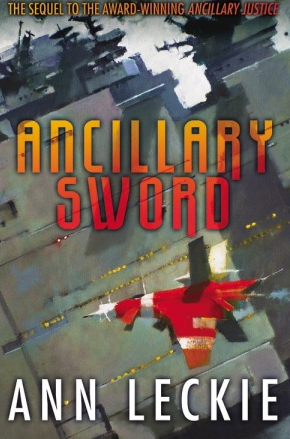 I’m currently whipping through Ann Lecki’s Ancillary series. It’s great fun; page turning space opera adventure with twisty plots and thoughtful meditations on justice, identity and gender along the way. I love the LeGuin/Butler/Russ/etc. tradition of feminist sci-fi, and Leckie does too, so that makes me happy.
I’m currently whipping through Ann Lecki’s Ancillary series. It’s great fun; page turning space opera adventure with twisty plots and thoughtful meditations on justice, identity and gender along the way. I love the LeGuin/Butler/Russ/etc. tradition of feminist sci-fi, and Leckie does too, so that makes me happy.
I can’t really recommend this as highly as LeGuin/Butler/Russ, though, nor with the enthusiasm I have for more contemporary writers like N.K. Jemisin and Gwyneth Jones. Leckie has plenty of smarts, and she writes well, but she’s just too…cheerful.
Some might be taken aback at the idea that the Ancillary series is cheerful. The central event of the books is when the main character—a spaceship, with connected ancillary human bodies—is forced to kill its captain, the love of its life. The ship is then dismantled, and one escaped ancillary body, now calling itself Breq, fless across the universe, consumed with sorrow.
That sorrow never goes away, nor really gets revenged (at least not after the first two volumes) which is why some folks might not immediately see the books as particularly happy. In fact, though, Breq’s personal pain becomes a kind of guarantor of a broader, more thoroughgoing justice. Breq in fact functions as a kind of superhero. She (most people in the novel default to the pronoun “she”), as a former ship’s ancillary, is incredibly physically adept, ancient and knowledgeable, and, as a former slave-body, uniquely attuned to the trials of the marginalized and oppressed.
In the second book, Ancillary Sword, especially, Breq’s unique qualifications and sympathies become a literal social justice deus ex machina. Dispatched as a powerful commander to Atoehk Station in the wake of a chaotic breakdown of the empire, where Breq encounters fairly transparent analogues of earth prejudice, ghettoes, and slave plantations. With vast political and personal abilities and an infallible sense of morality, Breq swoops in to show the locals the error of their ways. She orders repairs to the ghettoes, sparks wage negotiations on the plantations, and forces the recalcitrant citizens to confront their unjust preconceptions every one.
Part of the problem is that, as ship’s captain, Breq has access to instantaneous information from her ship which allows her to function as a semi-omniscient narrator; she knows what other characters are doing, and, often even what they are thinking and feeling. With this kind of panoramic view, Breq and the voice of the novel become almost simultaneous; Breq might as well be the author, which means that the book feels like Leckie setting up the other characters as problems to be solved by Breq. “Everything necessitates its opposite,” Breq says. “How can you be civilized if there is no uncivilized?” She’s reprimanding the Radchaai for their imperial ways…but she could be talking about the structure of the book itself, in which a plentful of foils are presented as less civilized so that Breq can show them the way.
There’s an instructive parallel here with the Octavia Butler’s Xenogenesis trilogy, in which creepy tentacled alien things descend from the sky after earth has destroyed itself to heal the humans and show them the path to happiness, great sex, and the acceptance of difference. The thing is, though, that Butler’s Oankali have their own selfish motivations—and also don’t exactly have the readers sympathies. The aliens are more noble and smarter than the humans—but they’re also imperial invaders, and since the reader is human, this imperial conquest comes across in sharp relief, even though in other respects the Oankali are clearly superior (morally and in other ways) to the folks they conquer.
Imperialism in, say, Afghanistan is often launched in the name of justice and mercy. If the imperialists impose women’s rights, is the imperialism justified? Isn’t there a problem with even phrasing the question that way? Butler’s novels are about this…but the Ancillary series is not, really. Leckie deals with many issues of injustice and marginalization, but she never really confronts the imperial implications of an outsider swooshing in to solve all of some backwards planet’s problems. Breq sees the problems with other power disparities, but her power as an occupier is never effectively interrogated or questioned. As a result, the problems the novel raises are resolved with an unconvincing neatness. The emperor is just a little too wise, a little too strong, and a little too good to be true.
